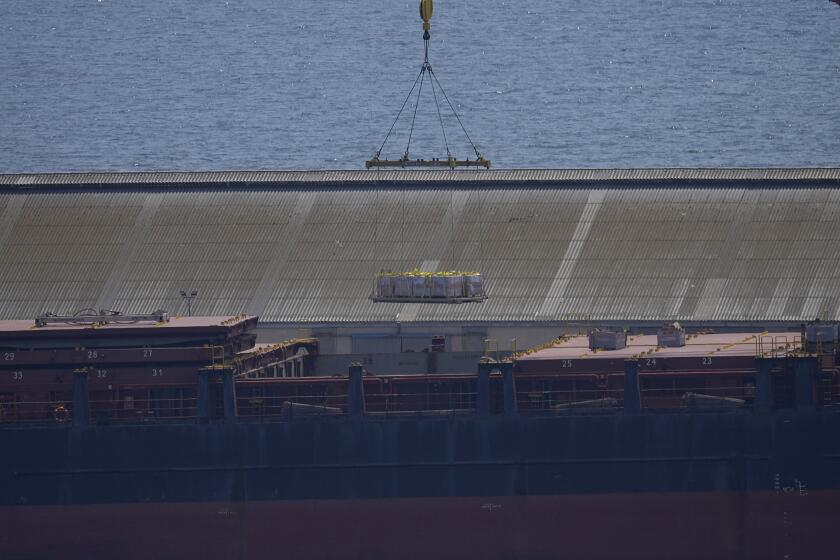Many Refugees Wind Up Prey in Albanian Frontier Town
“Off with you!” Lirim Cengu, a local landowner with a gun strapped to his hip, shouted at a group of refugees. To make his point absolutely clear, he fired two shots in the air and yelled, “Move away from my fence!”
Relief workers quickly encouraged the Kosovo Albanians camped along Cengu’s property line to shift a bit.
In a grassy field, other gun-toting men confronted workers with the Office of the U.N. High Commissioner for Refugees. They didn’t care that Albanian government officials had authorized the creation of a camp there. No refugees, the men ordered, persuading the U.N. workers with their firmness--and their firepower--to find another site.
Such confrontations are part of life in and around this tough-as-nails frontier town, which was a haven for smugglers and gunrunners long before refugees began streaming here from the war-torn Serbian province of Kosovo in neighboring Yugoslavia.
Generosity is still the prevailing spirit displayed by Albanians toward the Kosovo Albanians expelled by Serbian forces. Countless families in this struggling land have opened their homes to strangers. But sometimes--especially in the lawless north--ugly scenes play out, sometimes even with the help of the police.
The State Department, in a travel advisory issued well before the NATO bombing campaign against Yugoslavia began, called the area of Albania along the Kosovo border “exceedingly dangerous” and “outside effective government control.”
“Even persons traveling to this area solely to render humanitarian assistance to refugees have been attacked by bandits,” the State Department warned.
Certainly the refugees have not been immune. Latif Hetemi, 77, was asleep in his tent one rainy morning when he heard a commotion outside. He peered out and spotted a man making off with the horse that had pulled his wagon all the way from his village in western Kosovo.
Hetemi cried out to neighbors, who pursued the man. Eventually, the thief abandoned the horse and fled. Hetemi’s camp now has round-the-clock patrols to keep an eye on suspicious outsiders.
But livestock is the least of the problems. Since the influx of 1,200 tractors into Kukes, more and more of the farm machines--the last remaining possessions for many refugees--are disappearing into the night.
Begir Sejolihu, 67, broke down in tears as he recounted how someone stole his tractor when he left it unattended briefly to take his ailing grandson to a medical tent. If he ever is able to return to Kosovo, Sejolihu said, he and his family will have to walk.
“It was my only property,” he said. “We’ve suffered so much. When I entered into Albania, I thought, ‘Now we are safe.’ ”
Besides tractors, cars are another prime target. But it is difficult to make off with them if refugee families are living inside, and Serbian gunmen have already claimed most of the newer models.
Even police are getting a piece of the action. Two officers have been arrested in Kukes for assisting an organized theft ring, and an inspector with the national Ministry of Public Order said he has his eyes on at least half a dozen other officers.
For relief workers, putting up tents, digging latrines and distributing food have become the routine part of their work in Kukes. The confusion begins when multiple “owners” of the land where a camp is being built inevitably arrive, one after the other, demanding payment and sometimes firing guns.
Legal ownership of an individual piece of land in this onetime Communist state can be claimed by two, three or even a dozen people.
“The first guy comes showing papers, saying he absolutely owns it and needs some compensation,” said Jacques Franquin, the U.N. refugee agency’s Kukes-based spokesman. “The next guy has papers that say the same thing. Every time we try to build a camp, we have a parade of owners.”
The confusion is partly the result of flawed privatization, which has left most real estate unregistered with the government. But scam artists also are moving in, such as the man who tried to extract payment from refugees staying in a city park.
To keep conflict to a minimum, relief groups find themselves cutting a deal whenever they can, even if that means paying multiple owners for use of the very same plot of ground.
“It’s a nightmare,” Franquin said. “Nobody in this city can say definitely that a given piece of land belongs to Mr. X.”
Refugees and relief workers are not the only targets.
A BBC television crew discovered the Wild West nature of northern Albania on a road trip from Kukes to some surrounding villages. First, gunmen blocked the BBC car’s path and stole the crew’s camera and sound equipment. Farther up the road, the driver pulled out a gun of his own and demanded cash.
Sometime later, a man in downtown Kukes was asking passersby if they wanted to buy what he called “a big camera” cheap.
More to Read
Start your day right
Sign up for Essential California for news, features and recommendations from the L.A. Times and beyond in your inbox six days a week.
You may occasionally receive promotional content from the Los Angeles Times.






